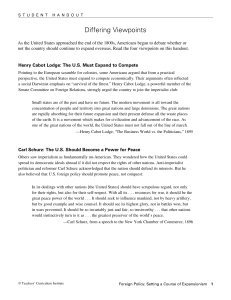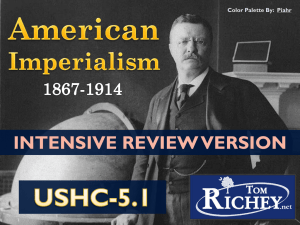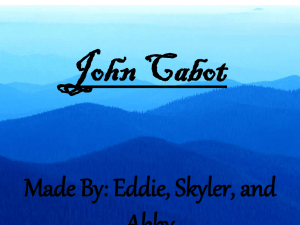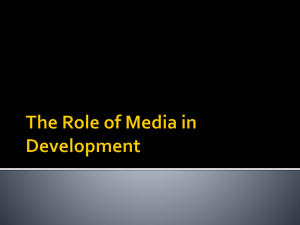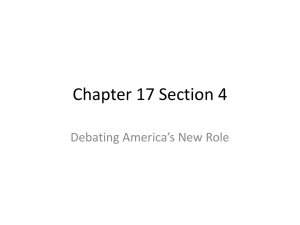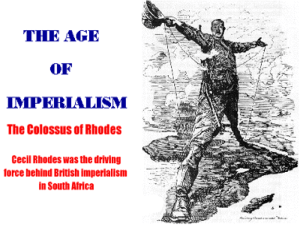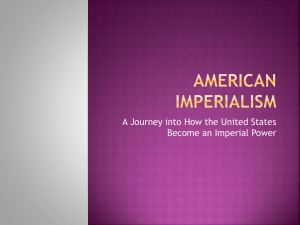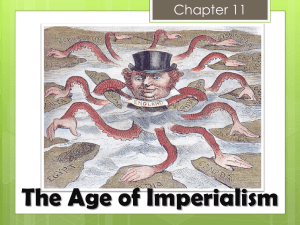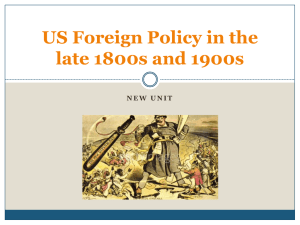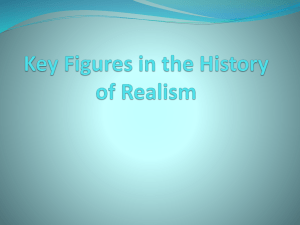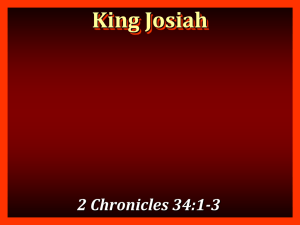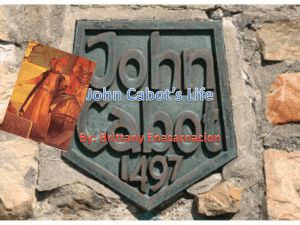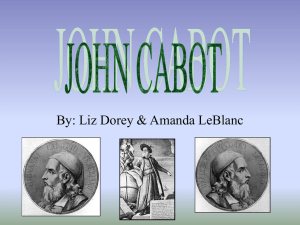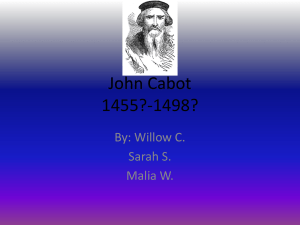American Imperialism Slideshow Moore
advertisement
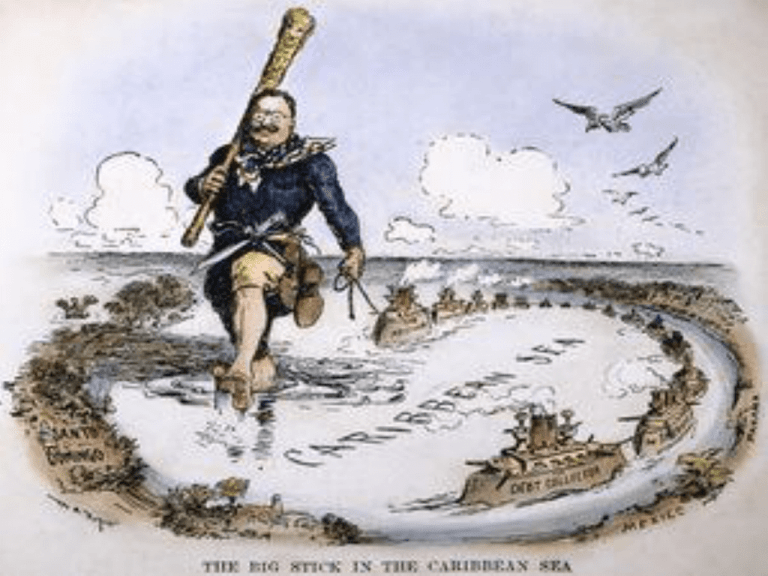
Pre-Quiz #1 Identify the 3 major goals to American Imperialism. 1. 2. 3. WORD BANK Imperialism Carl Schurz reformer national interest corollary isolationism Josiah Strong realism Monroe Doctrine Dollar Diplomacy intervene Alfred T. Mahan idealism Western Hemisphere Moral Diplomacy Henry Cabot Lodge Social Darwinism Anglo-Saxon Civilization Big Stick Policy Self-Determination 5. To involve yourself deliberately in a situation, especially in a conflict or dispute, in order to influence what is happening and, most often, to prevent undesirable consequences. 6. The political, military, or economic domination of one country over another. 7. A government policy based on the belief that national interests are best served by avoiding economic and political alliances with other countries. 8. A social theory stating that the political and economic advantages in a developed society are gained from the biological advantages of its collective membership (i.e. survival of the fittest). 9. A set of goals that a country considers to be important. Pre-Quiz #2 1. Identify the 3 major goals to American Imperialism. 2. Provide an example for each motivation. 3. Provide an example as to why some Americans were against imperialism. WORD BANK Henry Cabot Lodge; Carl Schurz; Josiah Strong; Alfred T. Mahan; realism; idealism 1. A naval officer and historian who believed that U.S. foreign policy should become a world power by building a strong navy via ships and acquiring convenient coaling stations. 2. An anti-imperialist politician who believed that the U.S. should defend its interests, but our policy should promote peace, not conquest. 3. A Christian missionary (someone who goes to another country to spread his/her religious faith) who believed it was the duty of the U.S. to morally spread its Anglo-Saxon civilization to the dark places of the world. 4. A United States Senator who encouraged America to expand in order to economically compete with other countries. 5. The U.S. foreign policy that focuses on practical (realistic) concerns and national self-interest (what we can gain from this experience: natural resources, Panama Canal, etc). 6. The U.S. foreign policy that focuses on moral values (right vs. wrong) and the spread of American ideals (democracy and capitalism). Pre-Quiz #3 1. Identify the 3 major goals to American Imperialism. 2. If REALISM focuses on what we can gain (i.e. natural resources, Panama Canal, etc.) from taking over other countries, which of the following gentlemen would be most likely to agree with the policy of REALISM? Henry Cabot Lodge Carl Schurz Josiah Strong Alfred T. Mahan 3. If IDEALISM focuses on the moral values (right vs. wrong) and the spread of American ideals, which of the following gentlemen would be most likely to agree with the policy of IDEALISM? Henry Cabot Lodge Carl Schurz Josiah Strong Alfred T. Mahan WORD BANK Imperialism Carl Schurz reformer national interest corollary isolationism Josiah Strong realism Monroe Doctrine Dollar Diplomacy intervene Alfred T. Mahan idealism Western Hemisphere Moral Diplomacy Henry Cabot Lodge Social Darwinism Anglo-Saxon Civilization Big Stick Policy Self-Determination 4. A term used by Josiah Strong that refers to white Englishspeaking peoples. 5. The political principle that stated that Europe should no longer involve itself in the Western Hemisphere. 6. A proposition or statement that is a logical extension of a principle or an original idea. 7. A person or a movement that tries to make change or tries to change others. 8. The half of the Earth that is to the west of the prime meridian, including North and South America and portions of western Europe and Africa. WORD BANK Imperialism Carl Schurz reformer national interest corollary 9. isolationism Josiah Strong realism Monroe Doctrine Dollar Diplomacy intervene Alfred T. Mahan idealism Western Hemisphere Moral Diplomacy Henry Cabot Lodge Social Darwinism Anglo-Saxon Civilization Big Stick Policy Self-Determination Roosevelt’s strong-arm approach to foreign affairs was modeled after this West African proverb. 10. Taft’s policy was to encourage and protect American trade and investment in Latin America. 11. One of Wilson’s policies was to promote and spread democratic ideals, rather than economic investment or the use of force. 12. Another one of Wilson’s policies was to allow the right of the foreign peoples to decide on their own government that was free of outside influence. 13. After taking a look at questions 9-12, which of the president’s policies would you MOST PREFER and LEAST PREFER? Pre-Quiz #4 Evaluate and rank the four gentlemen’s views towards American imperialism. Who would you have most likely to have agreed with at this time in American history? Why? • • • • Henry Cabot Lodge: Carl Schurz: Josiah Strong: Alfred T. Mahan: Pre-Quiz #5: Identify and explain how the “Four Schools” of American imperialism are represented in this cartoon. Pre-Quiz #6 1. Identify the names of the diplomatic policies taken by Presidents Roosevelt, Taft, and Wilson. 2. Explain what each of these policies meant. Pre-Quiz #7 1. Identify the names of the diplomatic policies taken by Presidents Roosevelt, Taft, and Wilson. 2. Explain what each of these policies meant. 3. Explain how each of the following gentlemen would react to each president’s foreign policy. • Henry Cabot Lodge: • Carl Schurz: • Josiah Strong: • Alfred T. Mahan: American Imperialism Roosevelt’s Great White Fleet December 16, 1907, and February 22, 1909, to demonstrate the strength of the new American Navy (43,000 miles). Motivating Factor #1: Military • The Desire for Military Strength – An increased military presence to keep pace with European powers • British Army = 5x bigger • British Navy = 10x bigger – Modern naval fleet to protect American business and shipping interests around the world; – National prosperity depends on control of the world’s sea lanes (acquire naval bases all over the world) American Imperialism Motivating Factor #2: Economic • Thirst for new markets – Raw materials needed to fuel America’s industrial machine; – New technology in the late 19th Century created more goods than Americans could ever consume; – Overseas markets for American agricultural & manufactured goods; – Foreign trade would solve unemployment & economic depression. American Imperialism Motivating Factor #3: Political • The Belief in Cultural Superiority – Social Darwinism: a freemarket competition will lead to the survival of the fittest; – Belief in racial superiority of Anglo-Saxons; – Responsibility of spreading Christianity and to civilize the savage world • (white man’s burden). What about those who were opposed to the ideals of American Imperialism? Motivating Factor: Peaceful Measures • Belief in Promoting Peace, Not Conquest. – Defend America’s interests with dignity and respect; – We already have enough land with westward settlement; – Our economy can regulate itself; – We have enough raw materials; – We have too many domestic problems with immigration and poverty; – Who defines the “superior culture” anyway? “A Man, A Plan, A Canal, Panama” • American interest in Panama in 1850 built a railroad to transport Americans during the California Gold Rush; • French/United States wants to build a canal on the Isthmus of Panama. – But the Isthmus of Panama belongs to Colombia and Colombia says “No!”; • Philippe Bunau-Varilla and Nelson Cromwell’s bold plan; • Panamanian Independence and American control of the canal until 1999!!! • American ingenuity: Locks which raise and lower ships in order to move them between two oceans; • Cost to build: 5,600 lives and $387 million! Atlantic Ocean The Annexation of Hawaii • Did we acquire Hawaii legitimately? • Businessmen, American minister, U.S. soldiers overthrow Hawaii’s queen. • 1959: 50th State & 90% support. • Democratic principles? – Sanford Dole = Pineapple; became Hawaii’s president without a single vote • President Cleveland re-examined the annexation of Hawaii • President McKinley + Congress = Control of Hawaii. • 1993: President Clinton + Congress = Apology. The Spanish-American War • President McKinley hesitant to go to war, served in the Civil War • Assistant Secretary of the Navy Theodore Roosevelt pushes for war • William Randolph Hearts and Joseph Pulitzer work up war fever (Cubans mistreated by Spanish); • The USS Maine explodes in Havana Harbor, America goes to war; • US defeats Spain; – Philippines, Puerto Rico, and Guam = US territories. • Platt Amendment = U.S. intervention in Cuba to defend “life, property, and individual liberties; The Philippine-American War • Sequel to the Spanish-American War: 250,000 lives lost; • Mark Twain and other famous authors suspicious of America’s intentions • White Man’s Burden = U.S. has a duty to “civilize” the “inferior Filipino culture.” • Guerilla warfare vs. total war; • Samar Island = U.S. soldiers killed anyone capable of firing a gun; • William Howard Taft as governor general, “Filipinos our little brown brothers.” • Lesson: Don’t overstretch our authority overseas. • • “Policing the Caribbean and Central America” “Intervention in Haiti” Germany demands a port in the Dominican Republic, the U.S. says no; Haiti experiences 102 revolts, wars, or coups in only 72 years!!! – – American intervention Charlemagne Peralte resisted the U.S. His dead body was photographed with a crucifix and a Haitian flag as a warning • Roosevelt (Big Stick Policy): U.S. must protect the Panama Canal and other American interests • Intervention in Latin America had four steps: 1. 2. 3. 4. Military Intervention Train and fund the police and military Sponser elections Leave the country to govern itself The Caribbean, Central America, and Haiti
